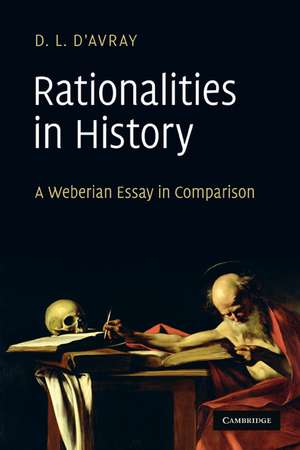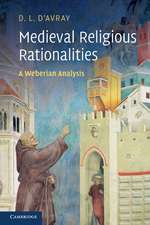Rationalities in History: A Weberian Essay in Comparison
Autor D. L. d'Avrayen Limba Engleză Paperback – 22 sep 2010
| Toate formatele și edițiile | Preț | Express |
|---|---|---|
| Paperback (1) | 177.43 lei 43-57 zile | |
| Cambridge University Press – 22 sep 2010 | 177.43 lei 43-57 zile | |
| Hardback (1) | 390.20 lei 43-57 zile | |
| Cambridge University Press – 22 sep 2010 | 390.20 lei 43-57 zile |
Preț: 177.43 lei
Nou
Puncte Express: 266
Preț estimativ în valută:
33.95€ • 35.54$ • 28.09£
33.95€ • 35.54$ • 28.09£
Carte tipărită la comandă
Livrare economică 07-21 aprilie
Preluare comenzi: 021 569.72.76
Specificații
ISBN-13: 9780521128087
ISBN-10: 0521128080
Pagini: 224
Dimensiuni: 153 x 228 x 10 mm
Greutate: 0.34 kg
Editura: Cambridge University Press
Colecția Cambridge University Press
Locul publicării:Cambridge, United Kingdom
ISBN-10: 0521128080
Pagini: 224
Dimensiuni: 153 x 228 x 10 mm
Greutate: 0.34 kg
Editura: Cambridge University Press
Colecția Cambridge University Press
Locul publicării:Cambridge, United Kingdom
Cuprins
Introduction; 1. Universal and specific rationalities; 2. The structure of values and convictions; 3. The dynamics of values and convictions; 4. The value-instrumental interface; 5. Formal rationality; 6. The formal-substantive interface; Conclusions; Appendix: Rationalities in a case before the congregation of the council.
Recenzii
'In this carefully crafted volume, D. L. d'Avray offers a strong argument about how various rationalities can be found in history and in populations around the world. By doing so, he discredits the association of formal rationality with modernity, and claims that instrumental reasoning is a human universal.' Raul Acosta, Journal of the Royal Anthropological Institute
'Unlike those historians who prefer to remain the prisoner of theories which are held unconsciously, David d'Avray's aim … is to engage explicitly with the 'ideal types' of rationality catalogued in Max Weber's work in order to show their empirical value in the study of the religion of the medieval West … constitute[s] a model of how historians can engage with social theory … clearly and wittily written and resort[s] to technical jargon in order to clarify the argument rather than to obscure it … logically structured and address[es] issues which are of interest not just to medievalists but also to historians of other periods, as well as to philosophers, anthropologists, sociologists and social theorists … draw[s] effortlessly on an impressive range of empirical examples and [is] the product of wide reading in philosophy and social science.' S. H. Rigby, English Historical Review
'Unlike those historians who prefer to remain the prisoner of theories which are held unconsciously, David d'Avray's aim … is to engage explicitly with the 'ideal types' of rationality catalogued in Max Weber's work in order to show their empirical value in the study of the religion of the medieval West … constitute[s] a model of how historians can engage with social theory … clearly and wittily written and resort[s] to technical jargon in order to clarify the argument rather than to obscure it … logically structured and address[es] issues which are of interest not just to medievalists but also to historians of other periods, as well as to philosophers, anthropologists, sociologists and social theorists … draw[s] effortlessly on an impressive range of empirical examples and [is] the product of wide reading in philosophy and social science.' S. H. Rigby, English Historical Review
Notă biografică
Descriere
The distinguished historian David d'Avray applies seminal Weberian ideas to the comparative history of religion and the philosophy of law.












